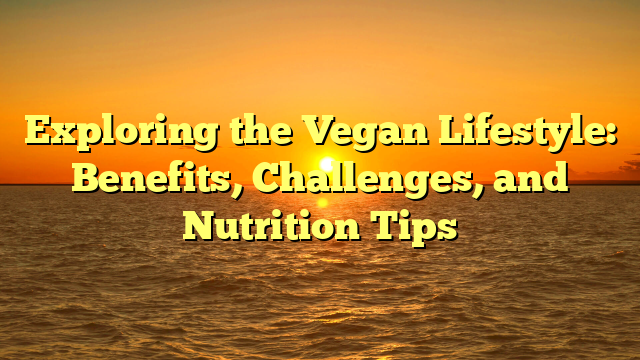Exploring the Vegan Lifestyle: Benefits, Challenges, and Nutrition Tips
Exploring the Vegan Lifestyle: Benefits, Challenges, and Nutrition Tips
Are you curious about the vegan lifestyle? In this article, we will delve into the world of veganism, highlighting the numerous benefits it offers, as well as the challenges that may arise. From improved health and environmental sustainability to the ethical considerations that come with eliminating animal products from your diet, we will explore it all. Additionally, we will provide you with essential nutrition tips to ensure you thrive on a vegan diet. So, whether you’re a seasoned vegan or simply considering a plant-based lifestyle, read on to uncover the wonders of the vegan world.
Benefits of the Vegan Lifestyle
Improved Heart Health
Adopting a vegan lifestyle can have numerous benefits for your heart health. By eliminating animal products from your diet, you can significantly reduce your intake of saturated fats and cholesterol. This dietary change can lead to lower blood pressure and improved blood flow, thus reducing the risk of cardiovascular diseases such as heart attacks and strokes. A vegan diet, rich in fruits, vegetables, whole grains, and legumes, is also high in fiber, which can further support heart health by reducing cholesterol levels.
Reduced Risk of Chronic Diseases
Following a vegan lifestyle has been associated with a reduced risk of various chronic diseases, including type 2 diabetes and certain types of cancer. A plant-based diet naturally provides a wide range of antioxidants, vitamins, and minerals, which play crucial roles in boosting your immune system and protecting your body against cellular damage. Moreover, the abundance of dietary fiber in plant-based foods aids in maintaining healthy digestion, preventing conditions such as constipation and diverticulosis.
Weight Management
If you’re looking to manage or lose weight, embracing a vegan lifestyle can be an excellent strategy. Plant-based diets tend to be lower in calories and saturated fats compared to diets that include animal products. Additionally, the high fiber content in plant-based foods helps to keep you feeling full and satisfied for longer periods, reducing the likelihood of overeating. By focusing on whole, unprocessed foods and practicing portion control, you can achieve and maintain a healthy weight.
Lower Environmental Impact
Choosing a vegan lifestyle can be a powerful way to reduce your environmental footprint. Animal agriculture is a significant contributor to greenhouse gas emissions, deforestation, and water pollution. By eliminating animal products from your diet, you can help conserve natural resources, reduce your carbon footprint, and mitigate the negative impact of the livestock industry on the planet. By making environmentally-conscious choices, you contribute to a more sustainable future for all.
Ethical Considerations
Many individuals adopt a vegan lifestyle due to ethical concerns regarding animal welfare. By choosing to exclude animal products from your diet, you actively promote a compassionate approach towards animals and minimize their suffering. Factory farming and intensive animal agriculture practices often involve conditions and practices that disregard the well-being and dignity of animals. By aligning your lifestyle choices with your values, you can make a positive impact and support a more compassionate society.
Challenges of the Vegan Lifestyle
Finding Adequate Protein Sources
One of the common challenges faced by vegans is ensuring an adequate intake of protein. While animal products are readily available sources of complete protein, plant-based sources can also provide all the essential amino acids necessary for a healthy diet. Incorporating foods such as legumes, tofu, tempeh, seitan, and quinoa into your meals can help meet your protein needs. Additionally, combining different plant-based protein sources throughout the day can ensure a good balance of amino acids.
Getting Sufficient Vitamins and Minerals
When following a vegan lifestyle, paying attention to your intake of certain vitamins and minerals is crucial for maintaining optimal health. Vitamin B12, which is primarily found in animal products, is one nutrient that may require supplementation. It is essential for nerve function and the production of red blood cells. Other important nutrients to be mindful of include iron, calcium, zinc, vitamin D, and omega-3 fatty acids. Incorporating fortified foods, such as plant-based milks and cereals, and considering supplements can help you meet your nutritional needs.
Social and Emotional Challenges
Living as a vegan in a predominantly non-vegan society can sometimes present social and emotional challenges. These can range from feeling isolated or different to encountering skepticism or criticism about your lifestyle choices. It can be helpful to seek support from like-minded individuals, join online communities, or attend vegan events and gatherings to connect with others who share your values. Engaging in open and respectful conversations with friends and family can also help foster understanding and acceptance.
Meal Planning and Preparing
Adopting a vegan lifestyle often requires a shift in meal planning and preparation habits. It’s important to learn about new ingredients, explore diverse cuisines, and discover exciting recipes to keep your meals enjoyable and satisfying. Planning your meals and snacks in advance can help ensure a well-balanced and nutritious diet. Experimenting with different cooking methods, exploring plant-based substitutes for favorite dishes, and making use of online resources and cookbooks can make transitioning to a vegan lifestyle more enjoyable and sustainable.
Eating Out and Traveling
Eating out at restaurants or traveling while following a vegan lifestyle can sometimes present challenges, as not all establishments may have vegan options readily available. However, with the growing popularity of plant-based diets, more restaurants are now offering vegan menu items or customizable options. Before dining out, it can be helpful to research vegan-friendly restaurants in your area or use smartphone apps that identify vegan-friendly establishments. When traveling, packing some nutrient-dense snacks and researching local vegan-friendly options can ensure you stay well-nourished and satisfied on your journey.
Nutrition Tips for Vegans
Adequate Protein Intake
Ensuring an adequate intake of protein is essential for vegans. Aim to include protein-rich foods such as legumes (beans, lentils, chickpeas), tofu, tempeh, edamame, seitan, quinoa, and chia seeds in your diet. Combining different sources of plant-based protein throughout the day can help meet your amino acid needs. If you have specific protein requirements or engage in intense physical activity, incorporating vegan protein powders or bars into your diet may be beneficial.
Balancing Macronutrients
While focusing on plant-based foods, it’s important to maintain a balance of macronutrients: carbohydrates, proteins, and fats. Including whole grains, fruits, vegetables, legumes, nuts, and seeds in your meals can help ensure a well-rounded macronutrient profile. Experimenting with different cooking methods and recipes can also help you create a varied and satisfying diet while meeting your nutritional needs.
Getting Essential Vitamins and Minerals
Pay special attention to your intake of certain vitamins and minerals that may be less abundant in a vegan diet. Ensuring adequate amounts of vitamin B12, iron, calcium, zinc, and omega-3 fatty acids is essential for optimal health. Consider incorporating fortified plant-based milks, cereals, and nutritional yeast into your meals. If necessary, consult with a healthcare professional to determine if supplements are needed to meet your nutritional requirements.
Incorporating Healthy Fats
Including healthy fats in your diet is essential for overall well-being. Opt for plant-based sources of fats, such as avocados, nuts, seeds, and plant-based oils like olive and coconut oil. These fats are rich in monounsaturated and polyunsaturated fatty acids, which can support brain health, improve nutrient absorption, and reduce inflammation in the body.
Supplements to Consider
Vegans should be aware of the potential need for certain supplements to ensure proper nutrient levels. Vitamin B12 is one nutrient that may require supplementation, as it is primarily found in animal products. Omega-3 fatty acids, specifically DHA and EPA, are also commonly found in fish but can be obtained from plant-based algal oil supplements. It’s important to consult with a healthcare professional to determine your individual supplement needs based on factors such as diet, lifestyle, and overall health.
By embracing the vegan lifestyle, you can experience numerous benefits for your health, the environment, and animals. While there may be some challenges along the way, with proper knowledge, planning, and support, you can thrive on a well-balanced and nutrient-rich vegan diet. Remember to focus on the abundance of plant-based foods available to you and enjoy the journey towards a more compassionate and sustainable lifestyle.










